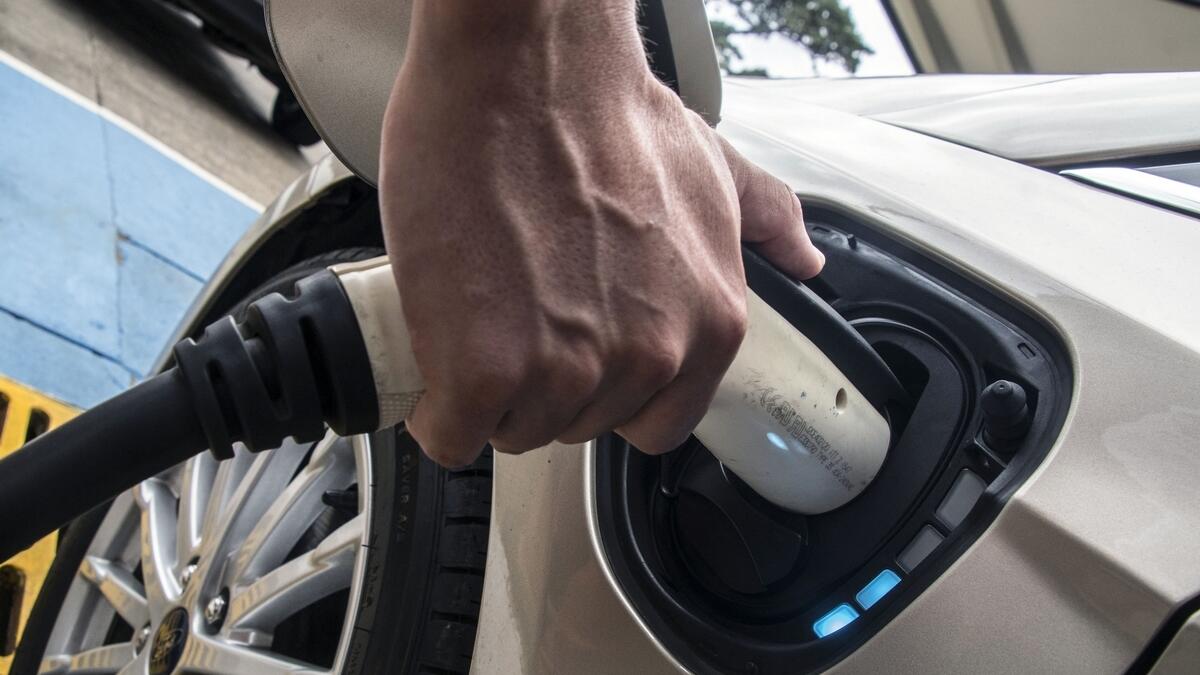Tamil Nadu EV Policy-2023 Employment Plan, Incentives And Other Features: Rs. 50000 Crores Investment Planning For The State’s EV Market.
The government of Tamil Nadu has released its electric vehicle policy-2023 with the goal of increasing EV usage and making the state a top location for EV manufacturing. The chief minister of Tamil Nadu, hopes to generate 1.50 lakh jobs and draw in investments of 50,000 crores.

Tamil Nadu EV policy-2023 employment and other features: Rs. 50000 crores investment planning for the state’s EV market.
The government of Tamil Nadu has released its electric vehicle policy-2023 with the goal of increasing EV usage and making the state a top location for EV manufacturing.
With the introduction of the Electric Vehicle (EV) Policy 2023, MK Stalin, the chief minister of Tamil Nadu, hopes to generate 1.50 lakh jobs and draw in investments of 50,000 crores.
According to the proposed policy, the state government will completely exclude all EV battery-operated vehicles from paying road taxes, including private cars. The duration of the insurance policy is five years.
Given that the dynamics of the industry are continuously changing, the state government has implemented the amended EV policy, which will be reviewed on a regular basis. The prior 2019 EV policy period expired at the end of 2022.
According to a Fortune Business Insights analysis, the Indian EV industry, which was estimated to be worth $3.21 billion in 2022, is predicted to increase to $113.99 billion by 2029, at a compound annual growth rate of 66.52%.
The Indian Electric Vehicle market will see notable growth in 2023 because of the changes in regulation and increasing investment. Tamil Nadu is going to be a big initiator to making this growth in the EV sector happen real soon.

The EV industry in Tamil Nadu has grown significantly and quickly as a result of the rise in EV demand.
New or expanded projects in the state that produce electric vehicles (EVs), electric vehicle components, electric vehicle supply equipment (EVSE), or electric vehicle charging infrastructure will be qualified for a subsidy of up to 2% of the project’s annual turnover for a period of ten years beginning from the date of commercial production. There will be a 4% yearly cap on the total investment in EFA.
The Tamil Nadu government seeks to provide manufacturing companies operating in the EV sector with a flexible incentive package through the package instead of a one size fits all model.
The multiple options provided under the package will be beneficial for firms operating across the EV manufacturing value chain namely OEMs, component manufacturing, battery manufacturing, and charging infrastructure manufacturing, by allowing them the choice based on their business models and cash flows.
The state government would provide incentives for commercial vehicles, ranging from Rs 5,000 for e-cycles to Rs 10 lakh for e-buses, based on the battery capacity and the kind of vehicle. The state government will provide incentives to switch commercial vehicles with internal combustion engines to EVs.
The policy states that the government will support Chennai, Coimbatore, Tiruchirappalli, Madurai, Salem, and Tirunelveli as pilot cities for implementing e-mobility solutions to support new or expansion projects in the manufacture of EVs, their components, and charging infrastructure.

Employment, tax exemption, and other features of the Tamil Nadu EV policy.
Tamil Nadu’s Electric Vehicles Policy 2023 includes a number of features, including the reimbursement of state goods and services tax (SGST), investment and turnover-based subsidies, advanced chemistry cell subsidies, electrification of public and commercial transportation, and the creation of electric vehicle cities.
The state provides a one-time choice for the manufacturing units to choose from reimbursement of SGST, turnover-based subsidy, capital subsidy, or special advanced chemistry cells capital subsidy.
For every new job produced throughout the policy period, EV projects would be given an employment incentive in the form of repayment of the employer’s contribution to the EPF, up to a maximum of Rs 48,000 per employee and residency of Tamil Nadu.
The policy also provides financial assistance to businesses that want to diversify or move into the EV manufacturing industry in order to upskill their staff. Additionally, the government has chosen to exclude EVs from paying road tax, registration costs, and permit fees.
Besides, Manufacturers of ICE are having transition benefits from the government of Tamil Nadu. Up to 10% of the car manufacturers’ current employees will have the opportunity to receive training on the EV production line. The required help would be given to Tamil Nadu residents through a training subsidy of Rs. 4000 per worker each month for six months.
The training subsidy will be higher for women and transgender employees, those with benchmarked disabilities, and SC/ST group members, at Rs. 6000 per worker every month for six months. These programs seek to advance social inclusion, job growth, and the expansion of the EV sector in the state.
There are many benefits to providing electric vehicle subsidies. First off, it contributes to EV cost reduction, making them more accessible to consumers. As a result, more people are compelled to buy EVs, which can reduce greenhouse gas emissions, improve air quality, and lessen reliance on fossil fuels.
The 100% road tax exemption for battery-operated two-wheelers, private cars, three-seater autorickshaws, transport vehicles (including taxis and tourist cars), light cargo carriers (including three-wheelers), and buses have been extended by the Tamil Nadu government until December 31, 2025.
The same kinds of cars will continue to be exempt from registration taxes and levies through December 31, 2025. Auto-rickshaws, transport vehicles (including taxis and tourist cars), light cargo carriers (including three-wheelers), and buses are among the categories of EV battery-operated vehicles that will be exempt from permission payments until December 31, 2025.
The Tamil Nadu government will also modify the power rate for public charging stations and provide incentives to charging and battery-swapping stations in accordance with the new EV policy.
By luring EV OEM & component manufacturers to establish facilities in the state, the new policy seeks to make Tamil Nadu a preferred location for EV manufacturing in South-East Asia, build a strong industrial ecosystem and infrastructure to attract manufacturing units, and develop indigenous EV manufacturing value chains.
With multiple EV OEMs locating their manufacturing facilities in this area, Hosur has emerged as the top region for EV manufacturing. The government is trying to facilitate and assist the manufacturing of EVs, components, particularly EV cell technology, batteries, and charging infrastructure in the state through an EV special manufacturing package because the industry is still in its infancy.
In Tamil Nadu, a sizable part of the public transportation system is made up of buses run by State Transport Undertakings (STUs). Through a phased augmentation and replacement strategy, the government will electrify these fleets. By 2030, the state aims to boost the proportion of electric buses in the fleet to 30%.
Through multilateral credit programs, the STUs will be urged to electrify their fleets. The state will facilitate the gradual transition to EVs of its private bus fleets and the vehicle fleets of educational institutions like schools and colleges.
Adoption and possible growth of the EV sector in India
In a price-sensitive country like India, the adoption of EVs is being pushed by affordability, sustainability, and environmental concerns. As oil prices climb, EVs present a longer-term, more cost-effective alternative. Their increased popularity is partly ascribed to the fact that they are less expensive to operate and maintain than classic petrol-powered cars.
Changes in policy, affordable battery production, and infrastructure growth will be the main drivers of growth in 2023. In addition, a tailwind is already apparent in the sector.
In terms of policy, investment, and growth, 2023 will be a pivotal year for the Indian EV market.
Implementing new regulations and providing more clarification on current ones is estimated to be one of the major advancements in the EV sector in 2023.
Two important laws that have shaped the sector in recent years are the National Electric Mobility Mission Plan (which aims to achieve 30% electric mobility by 2030) and the Faster Adoption and Manufacturing of Electric Vehicles (FAME) program, which offers financial incentives to EV customers and producers.
281 charging Stations have been approved for Tamil Nadu as part of FAME II, which would spur the development of the charging infrastructure.
Tamil Nadu will invest in budgetary allocations to build charging infrastructure and consider offering the infrastructure as a service to commercial operators in order to promote the adoption of EVs. These policies will be used by the government to improve the infrastructure for charging.
To promote the use of EVs in the state, Tamil Nadu’s Electric Vehicles Policy 2023 is a great step. The measures to convert a sizeable portion of the state’s public transportation fleet to EVs and the creation of charging infrastructure will facilitate their adoption, and a comprehensive set of incentives and subsidies for producers, customers, and charging infrastructure providers will help to make EVs more accessible and affordable.
It is hoped that other Indian states will adopt Tamil Nadu’s model and go in the same direction of a cleaner, greener, and more sustainable future.
edited and proofread by nikita sharma




